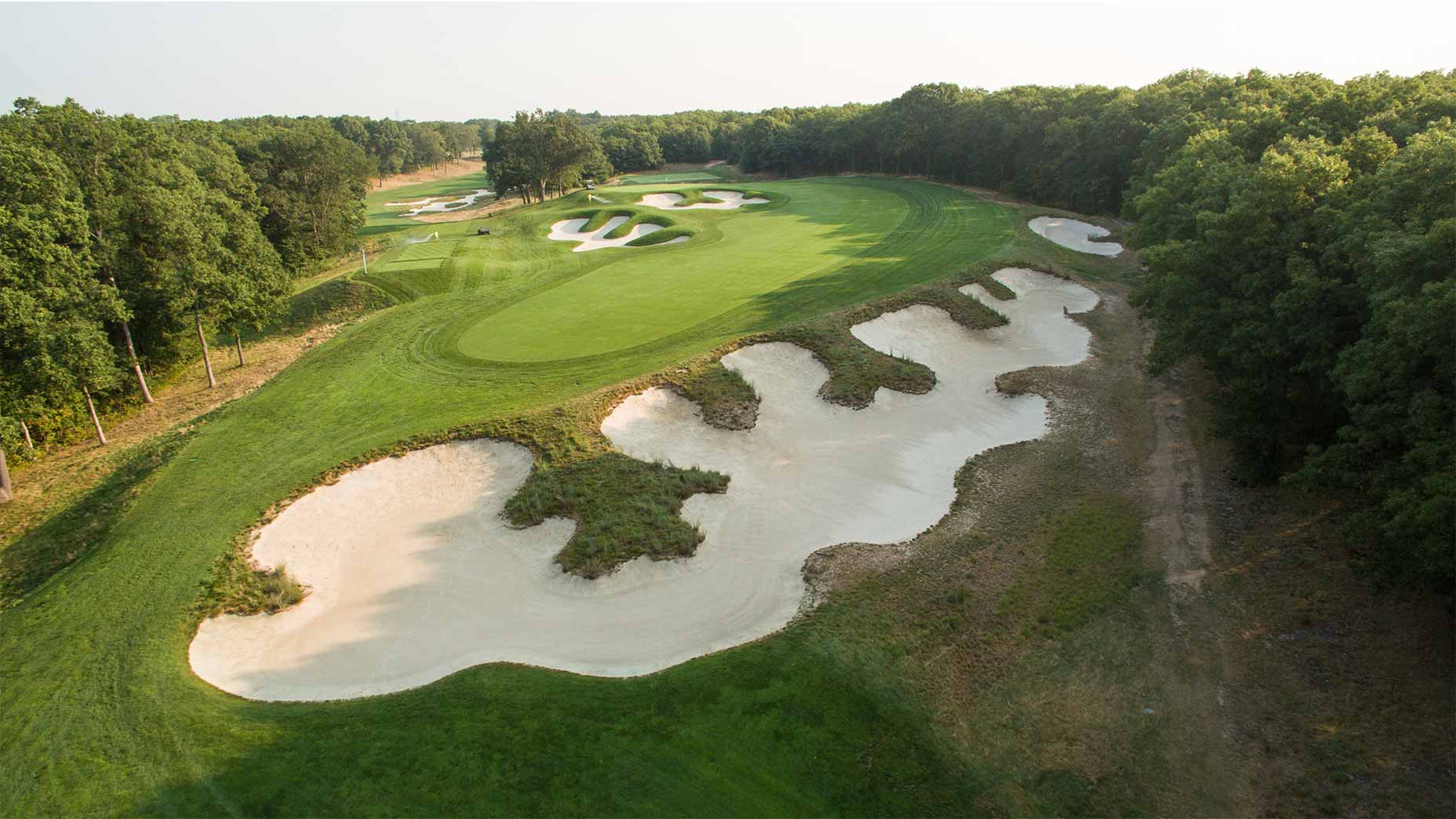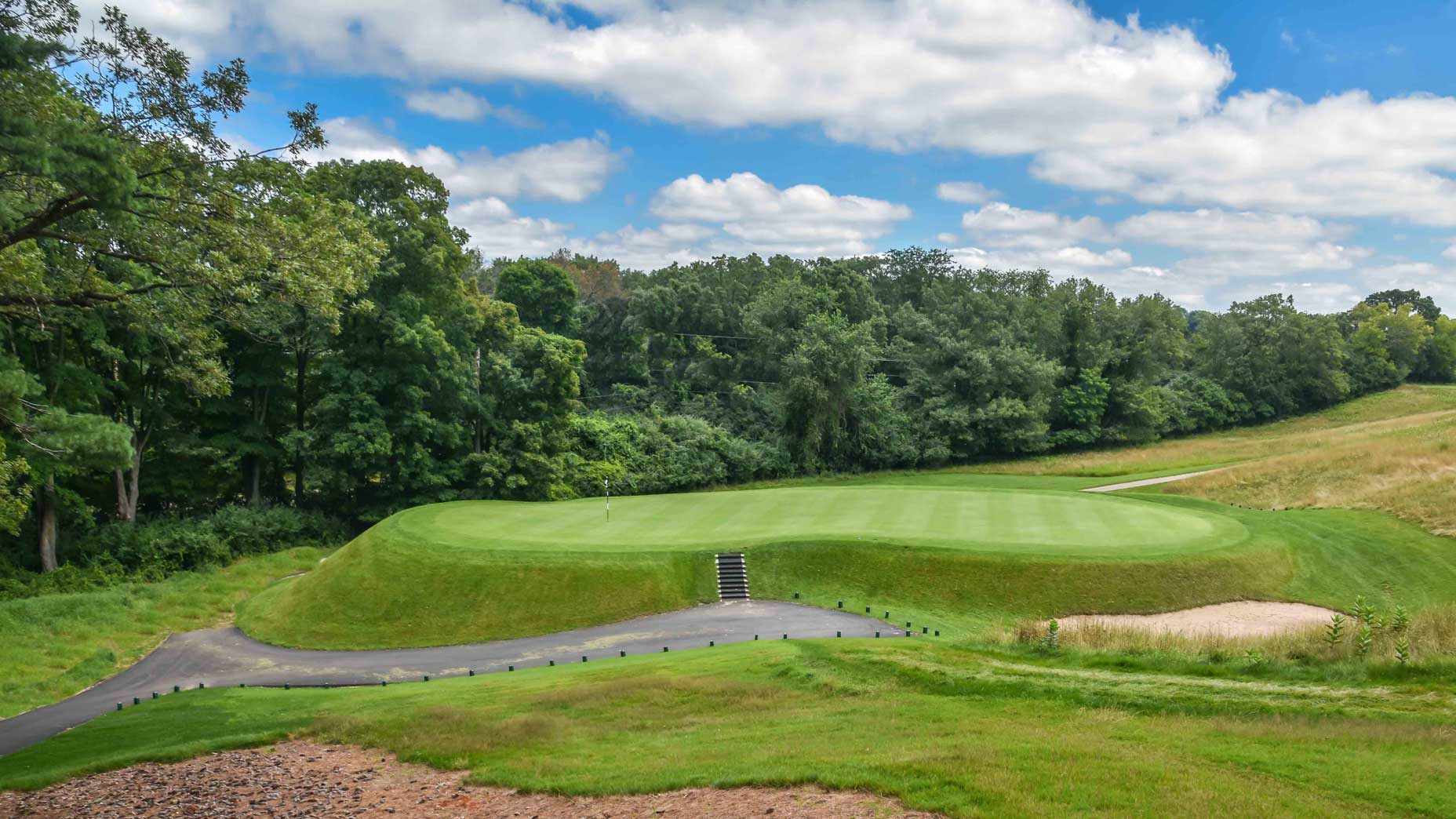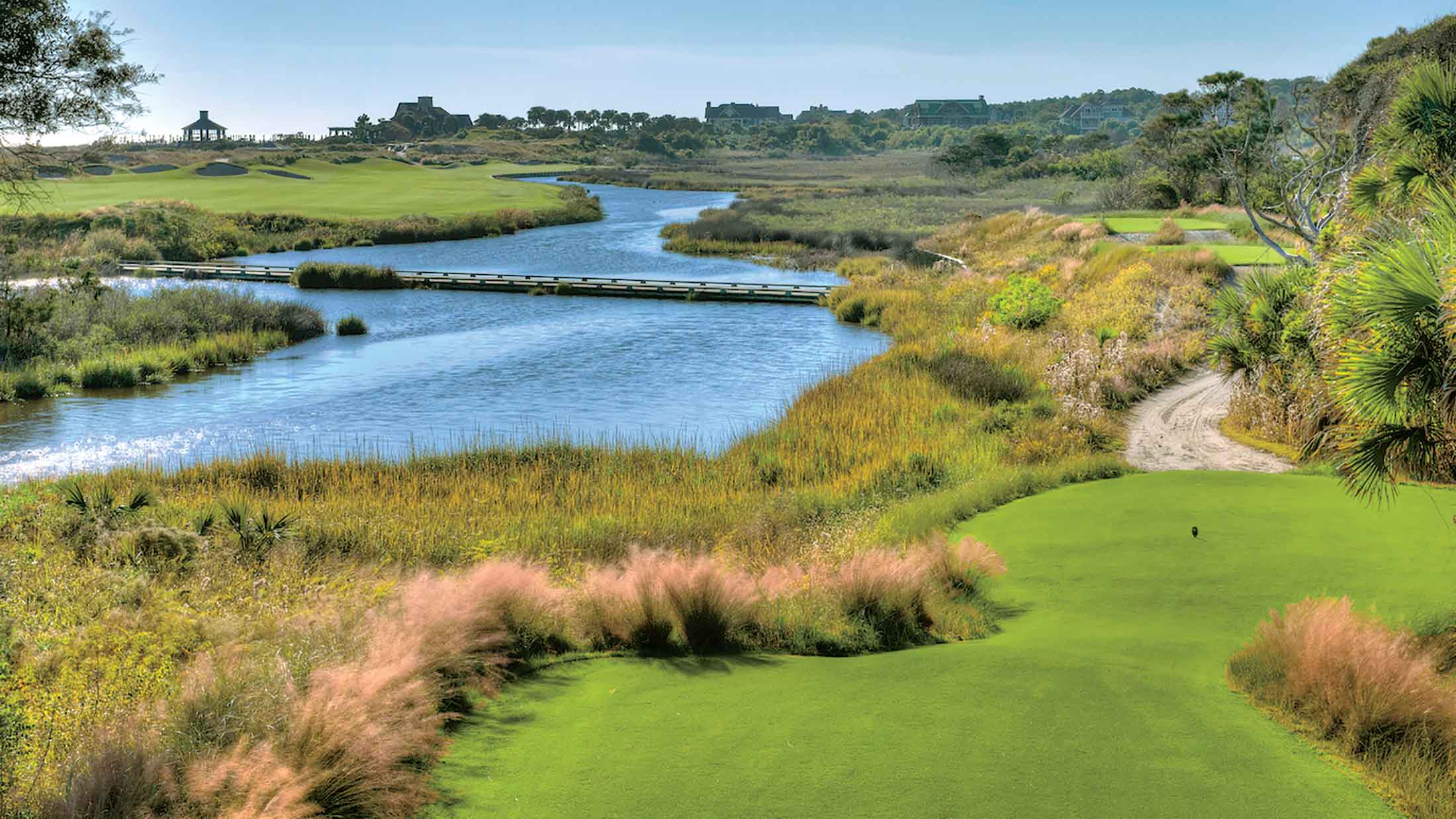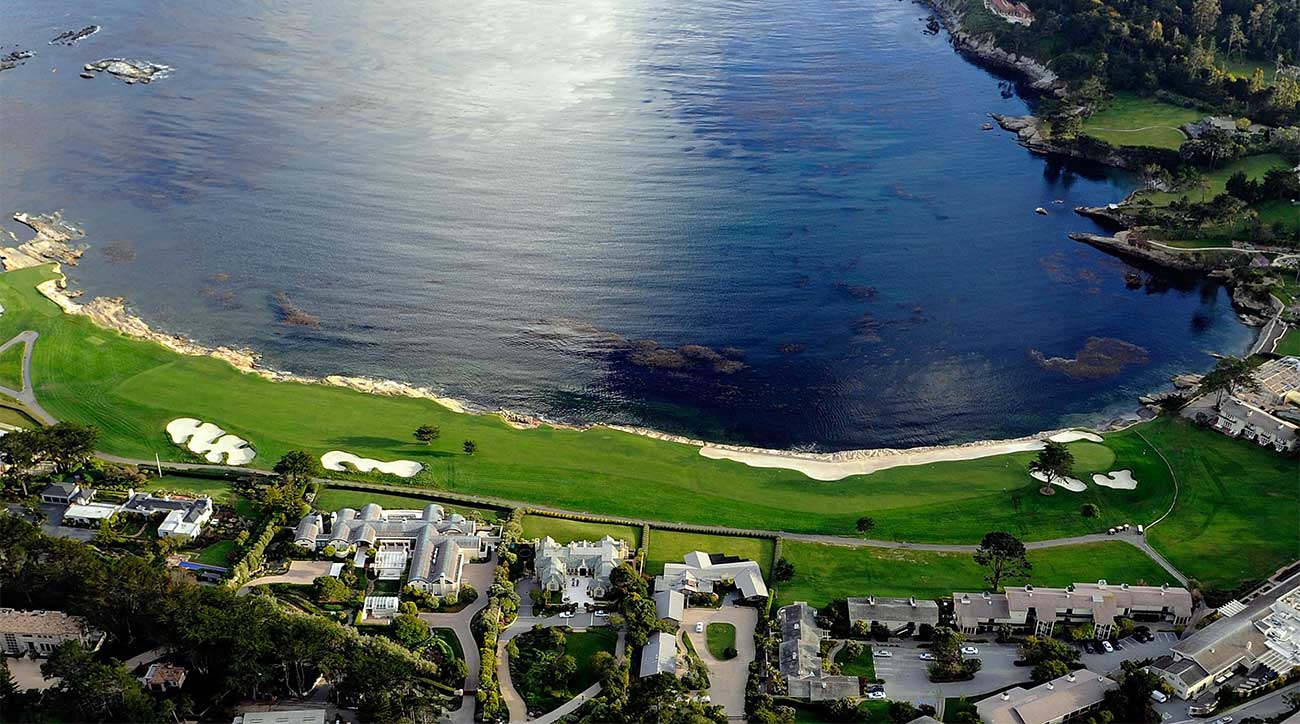Josh Sens
Clockwise from bottom left: Bethpage Black (4), Old Macdonald (16), Lawsonia Links (7), Ocean Course (13).
See credits below
We all have courses that we dream of playing. This is something different.
This is a course we fantasize about.
It exists only in our imagination, composed of 18 holes from 18 of the finest public-access courses in the United States: GOLF’s Top 100 You Can Play for 2024-25. While conceiving of this layout was a whimsical pursuit, we imposed parameters: the course would have to play to a par 72, and each hole in its routing would have to fall in the same sequence as it does in the original course. We thought long and hard, and we leaned on our course rating panelists for insights. The choices weren’t easy, but the result was worth all the deliberating and debate. Here’s our ultimate 18, a course we’d love to play, if we only could.
1. Sheep Ranch, par-5, 549 yards
Bandon, Ore.
Some courses start with a friendly handshake. This is more like an excited fist-bump, a reachable par-5 that combines a scoring opportunity with strategic options and arresting views. From a high point on the property, it plays over a brow and around a gentle bend toward a green with the Pacific spreading out behind it. The ocean reveal when you turn the corner is as exhilarating as almost any vista in the game, and the prospect of a bold second shot giving way to birdie — or better — will get your blood pumping, too.

Christian Hafer
2. Pinehurst No. 2, par-4, 439 yards
Pinehurst, N.C.
No dream 18 would be complete without a contribution from the cradle of American golf. This doglegged bruiser tempts you to try and cut it down size by playing up the right side off the tee, but the slightest push brings a sandy waste and wire grass into the picture. The safer route is up the left, flirting with a pair of fairway bunkers, which leaves a longer approach to a green with a hump in its middle that shrugs off shots in all directions.
3. Karoo Course, Cabot Citrus Farms, par-3, 290 yards
Brooksville, Fla.
Size matters, but only so much, and the gaudy yardage here is not the final measure of a hole that looks much harder than it plays. If you keep your wits about you on the tee, you can take advantage of a kick-slope on the right, which caroms balls toward a large, undulating green that has a wealth of entertaining hole locations. Given the length, par is immensely gratifying, and it happens more often than you might think.
4. Bethpage Black, par-5, 517 yards
Farmingdale, N.Y.
A sign by the 1st tee advises golfers that the Black Course is meant “for highly skilled” players only. Consider it fair warning. By the time you arrive at this risk-reward par-5, which zigs around a cluster of bunkers on the left then up a 50-foot rise to a blind green, you’ll probably feel the need to get a shot back. But get too aggressive, and you’ll wind up giving several more away.

Getty Images
5. Gamble Sands, par-4, 517 yards
Brewster, Wash.
Brawny but beguiling, this stout par-4 invites you to blast it up the right to shorten your approach. But that leaves a blind shot to a green with a world of sandy trouble behind it. The less obvious play is the savvier decision, up the left side of the fairway. From there, it’s a longer second but a better angle, with a chance to get creative by bounding the ball in.

Brian Oar
6. Pacific Dunes, par-4, 316 yards
Bandon, Ore.
To be aggressive, or not to be aggressive. Hamlet would have scratched his chin forever if he’d ever faced the options on this bedeviling beauty. Hard to blame him, given the demands of a slender, dune-top green with steep drop-off behind it and a fronting bunker that some refer to as the “devil’s a-hole.” Except that it is far bigger than that.
7. Lawsonia Links, par-3, 159 yards
Green Lake, Wisc.
Story goes that a boxcar is buried under the green of this sublime par-3. We can’t confirm that. But we can guarantee that if you miss short or right, you’ll put yourself in peril, faced with a pitch up a steep embankment — and the prospect of your round going off the rails.

Patrick Koenig
8. Pinehurst No. 10, par-4, 385 yards
Pinehurst, N.C.
“Double-blind” is a poker term. But it applies nicely to this wild par-4, which plays through the spoils an early 20th-century mining operation, over a Matterhorn-like hillock that conceals much of the fairway, then to a punchbowl green partly shrouded by a dune.
9. Harbour Town Golf Links, par-4, 332 yards
Hilton Head, S.C.
Unlike many regular stops on the PGA Tour, Harbour Town doesn’t lend itself to bomb-and-gouge attacks. Its demands are more subtle, as evidenced by this sly par-4, which is reachable for the game’s biggest hitters but risky no matter how you take it on, thanks in large part to a heart-shaped green with a big trap in a front and heart-breaking pot bunker in back.
10. Pasatiempo, par-4, 437 yards
Santa Cruz, Calif.
Many of the features at Pasatiempo, Alister Mackenzie’s public-access masterpiece, foreshadow the architect’s later work at Augusta. You see it plainly in the sweep and tumble of this grand par-4, which would look right at home at the far end of Magnolia Lane.
11. Karsten Creek, par-3, 209 yards
Stillwater, Okla.
Pretty and punishing. If those words remind you of someone you dated in high school, snap out of it! We’re talking about a stout par-3 on the home course of the Oklahoma State men’s and women’s golf teams. It plays through a chute of trees to an elongated green with water front and back, and bogie or worse waiting almost anywhere you miss.
12. Prairie Club, Dunes, par-5, 548 yards
Valentine, Neb.
With acres of fairway to aim for off the tee, finding the short grass is not the issue. The greater intrigue comes on your second shot to a green set in a hollow between deep sandy wastes. Look around. The prairie views are endless. So are the possibilities.
13. Ocean Course at Kiawah, par-4, 404 yards
Kiawah Island, S.C.
Pete Dye was known as the Marquis de Sod but he could have been dubbed the Duke of Deception. One glimpse of the canal that runs along the right, and your instinct is to bail out left, where a cluster of fairway bunkers will do you no favors. The wiser choice is to settle on how much of the water you want to carry, and then swing with full commitment. The visuals are frightening. But isn’t that part of way you play? Testing your ability to face down fear.

Uzzell Lambert
14. Chambers Bay Golf Course, par-4, 450 yards
University Place, Wash.
From an elevated tee, you get a gawker of a view of Puget Sound. But don’t let that distract you. This big-boy of a Cape hole, with its elbow bent around a sea of bunkers, requires an appetite for risk and sharp execution to a fairway with a speed slot that you’ll want to catch to have much hope on your second shot.
15. The Lido, par-4, 438 yards
Nekoosa, Wisc.
What’s in a name? This par-4 is called “Strategy,” which makes sense, as the angled cross bunkers on its ample fairway present you with a puzzler on your drive. But “Strategies” should probably be the moniker instead. Shortly after he finished building it, Tom Doak was asked how he thought the hole should be played. “I’ll let you know when I figure that out myself,” he said.
16. Old Macdonald, par-4, 433 yards
Bandon, Ore.
Old MacDonald is an homage to C.B. Macdonald, and its holes pay tribute to his famous templates. This rousing par-4 is a cap-tip to Macdonald’s Alps hole at National Golf Links, which itself is a riff on the Alps at Prestwick — the key distinction being that its large, defining dunes do not blind every approach shot. You can get a clear look in if you drive it boldly up the right.

Evan Schiller
17. TPC Sawgrass, par-3, 139 yards
Ponte Vedra Beach, Fla.
Brilliant design or gawd-awful gimmick? This island-green par-3 is a polarizing hole, and you’re entitled to your opinion. But here’s the thing: You’ve got to play it first.
18. Pebble Beach, par-5, 541 yards
Pebble Bach, Calif.
You’ve probably seen the photo of Jack Nicklaus leaning against the wooden fence that flanks the tee of this fabled par-5. Many people who play Pebble pose in the same position, and not just because they want to replicate an image. No matter who you are, the setting does it to you: It begs you to pause and drink it all in.

Getty Images

Josh Sens
Golf.com Editor
A golf, food and travel writer, Josh Sens has been a GOLF Magazine contributor since 2004 and now contributes across all of GOLF’s platforms. His work has been anthologized in The Best American Sportswriting. He is also the co-author, with Sammy Hagar, of Are We Having Any Fun Yet: the Cooking and Partying Handbook.

